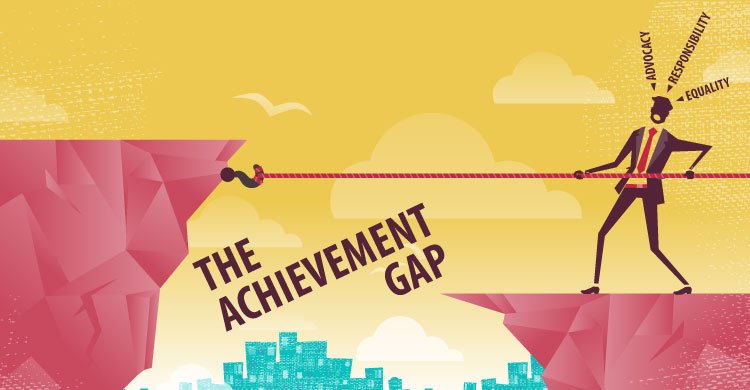It is clear that the paths taken in the past to close the achievement disparities in American public schools, also known as the Achievement Gap, have not been effective. Despite billions of dollars dedicated to achieving the goal of academic equality in every public school, the gap still remains, and it is as large as it has ever been. We should not be able to predict student success in school based upon factors like race, income, and home language. So, what will it take to close this stubborn gap?
A change in mindset is in order. We have to acknowledge that as much as professionals and politicians discuss the issue of equity in school, there are some communities that enjoy the benefits of outperforming other school systems. Many view this advantage as an asset. Real-estate values and population shifts can partly be connected to performance of local schools on state and national exams (Frankenberg & Orfield, 2012). Americans love the concept of equality, but the evidence shows that they do not always embrace the reality of equality. Understanding this reality, schools that struggle to perform have to take on the task of improving themselves, because there is very little external desire to close the gap; in fact, many communities benefit from it.
Change will require a liberation mindset, which in turn will create liberating cultures that will properly serve all students. Liberty is the right of every human being, and just like equality, liberty is identified in the United States Declaration of Independence as a guarantee, alongside the right to life and the pursuit of happiness. The liberation mindset is an unwavering set of collective beliefs and actions rooted in the goal of achieving high levels of academic and social success for all students, despite internal or external barrier.
There are three main characteristics of the liberation mindset:
- Equality: The belief that human potential is not a function of personal characteristics like race, gender, economic status, home language, national origin, or disability.
- Responsibility: The belief that we will hold ourselves as educators responsible for nurturing each student to his or her potential. We will accept the responsibility to develop our professional knowledge, practice, and systems to be responsive to the needs of our student population.
- Advocacy: The belief that people and entities outside of school must play an active and supportive role in the development of our students. We will hold others accountable for supporting our efforts to properly educate our students through active participation, financial support, positive publicity, providing experiences, and legislation.
Leadership at all levels will be important in championing this mindset and organizing the policies and resources necessary to move from beliefs to actions. Schooling requires profound contributions from a lot of people, and leadership is needed at many levels, including the classroom, principal’s office, central office, home, community, and in the legislative chambers. But when it comes to leadership in changing mindset and culture, school leadership, especially the principal, becomes very important in this endeavor. “The school principal is in the best position to change the important behaviors and habits of a school” (Usdan, McCloud et al., 2000).
Schools that develop the liberation mindset do not view internal and external obstacles as insurmountable; they view them as challenges and opportunities for growth. They do what many perceive as impossible. They embrace an egalitarian belief system, and they possess superior professional skill. The recognize that students are not at-risk, but as Dr. Yvette Jackson describes, school dependent (Jackson, 2011). They believe that with the right guidance, resources, and enough time, all students can become academically and socially successful.
References:
Frankenberg, E. and G. Orfield (2012). The Resegregation of Suburban Schools: A Hidden Crisis in American Education. Cambridge, Massachusetts, Harvard Education Press.
Jackson, Y. (2011). The Pedagogy of Confidence: Inspiring High Intellectual Performance in Urban Schools. New York, NY, Teacher College Press.
Muhammad, A. (2015). Overcoming the Achievement Gap Trap: Liberating Mindsets to Effect Change. Bloomington, IN, Solution Tree Press.
Usdan, M., B. McCloud, et al. (2000). Leadership for Student Learning: Reinventing the Principalship. Washington, DC, Institute for Educational Leadership.
[author_bio id=”31″]






